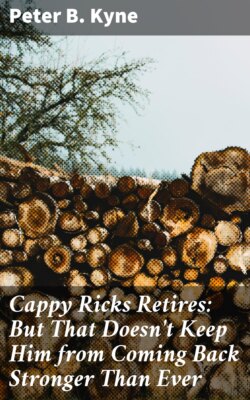Читать книгу Cappy Ricks Retires: But That Doesn't Keep Him from Coming Back Stronger Than Ever - Peter B. Kyne - Страница 9
На сайте Литреса книга снята с продажи.
“SEABORN”
ОглавлениеTable of Contents
2 boards, 1” x 8” and up, and too great a percentage of 4” x 6'-20' No. 1 clear. And there were mighty few clear twenty-foot logs coming into the boom these days.
“Well, will a cat eat liver?” declared Cappy Ricks. “I should say we do accept. Why, man, she'll make forty thousand dollars on the voyage, and whether she goes to Batavia or Manila, we're certain to get a cargo back.”
“All right, I'll wire acceptance,” Skinner replied, and paused long enough to make a notation on the message: “O.K.—Ricks.” Mr. Skinner meant nothing in particular by that. He was a model of efficiency, and that was his little way of placing the responsibility for the decision in the event that the wisdom of said decision should, at some future time, be questioned. Mr. Skinner never took unnecessary chances. He always played a safe game.
It is necessary to state here also that Matt Peasley was not in the office when that telegram arrived from Seaborn & Company. If he had been this story would never have been written. He was down at Hunter's Point drydock, superintending the repairs to the steam schooner Amelia Ricks, which recently on a voyage to Seattle had essayed the overland route via Duxbury Reef. When Matt reached home that night he found his ingenious father-in-law fairly purring with contentment.
“Well, Matt, old horse,” Cappy piped, “I've chartered the Narcissus. Norfolk to Batavia or Manila with coal. Got a glorious price—ten dollars a ton. That's what we get for holding off until the last minute.”
“That's encouraging,” Matt answered pleasantly, and asked no further questions. He was obsessed with the engines of the Amelia Ricks. It was going to cost a lot of money to put them in condition again, and he remarked as much to Cappy. Thus it happened that they entered into a discussion of other matters, and the good ship Narcissus, having finished discharging her cargo of nitrate, dropped down to Norfolk, where Captain Michael J. Murphy proceeded to let a stream of coal into her at a rate that promised to load her fully in less than four days.
It is worthy of remark, at this juncture, that Mike Murphy and Terence Reardon had, by this time, cast aside all appearance of even shirt-sleeve diplomacy. Diplomatic relations had, in fact, been completely severed. Crossing the Gulf Stream, Murphy had called the engine-room on the speaking-tube and politely queried if Mr. Reardon didn't think he could get a few more revolutions out of her. To this Mr. Reardon had replied passionately that if such a thing were possible he would have done it long ago without waiting to be told. He desired to inform Captain Murphy that he knew his business; whereupon Murphy had replied that he never would have guessed Mr. Reardon was that intelligent, judging by the face of him. In disgust Mr. Reardon had replied: “Aw, go to—” and then tried to close the speaking-tube before the captain would have the opportunity to retort. However, Michael J. knew his own mind, and, like all the Irish, was a marvel at repartee. Quick as was Terence Reardon, therefore, Michael J. Murphy was quicker. Perhaps all of his message had not been delivered before Reardon closed the tube, but the chief got enough of it for all practical purposes.
He caught one word—“Renegade”; a word so terrible that it left the chief engineer speechless with fury, and before he could call the skipper a baboon, the golden opportunity was gone. He closed the tube with a sigh.
